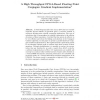Free Online Productivity Tools
i2Speak
i2Symbol
i2OCR
iTex2Img
iWeb2Print
iWeb2Shot
i2Type
iPdf2Split
iPdf2Merge
i2Bopomofo
i2Arabic
i2Style
i2Image
i2PDF
iLatex2Rtf
Sci2ools
119
click to vote
ARC
2008
Springer
2008
Springer
A High Throughput FPGA-based Floating Point Conjugate Gradient Implementation
As Field Programmable Gate Arrays (FPGAs) have reached capacities beyond millions of equivalent gates, it becomes possible to accelerate floating-point scientific computing applications. One type of calculation that is commonplace in scientific computation is the solution of systems of linear equations. A method that has proven in software to be very efficient and robust for finding such solutions is the Conjugate Gradient algorithm. In this paper we present a parallel hardware Conjugate Gradient implementation. The implementation is particularly suited for accelerating multiple small to medium sized dense systems of linear equations. Through parallelization it is possible to convert the computation time per iteration for an order n matrix from (n2 ) cycles for a software implementation to (n). I/O requirements are scalable and converge to a constant value with the increase of matrix order. Results on a VirtexII-6000 demonstrate sustained performance of 5 GFLOPS and projected results o...
| Added | 12 Oct 2010 |
| Updated | 12 Oct 2010 |
| Type | Conference |
| Year | 2008 |
| Where | ARC |
| Authors | Antonio Roldao Lopes, George A. Constantinides |
Comments (0)

